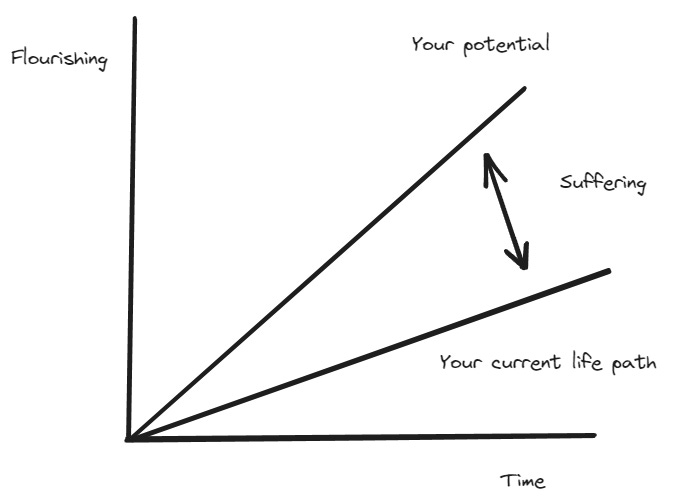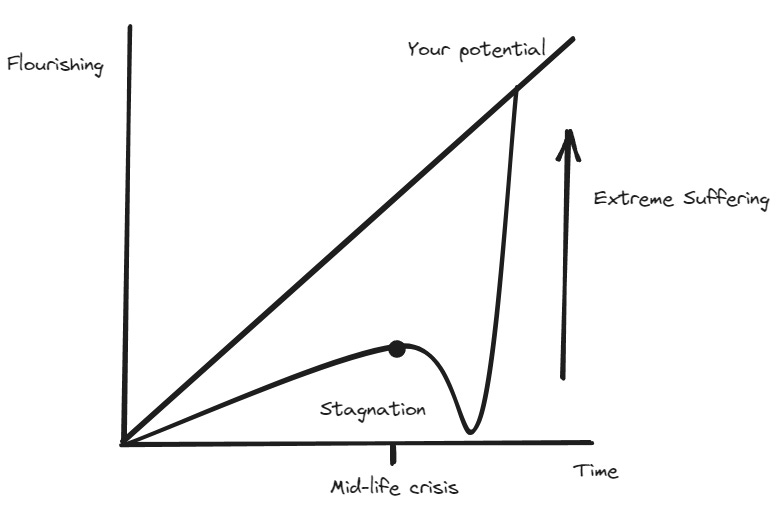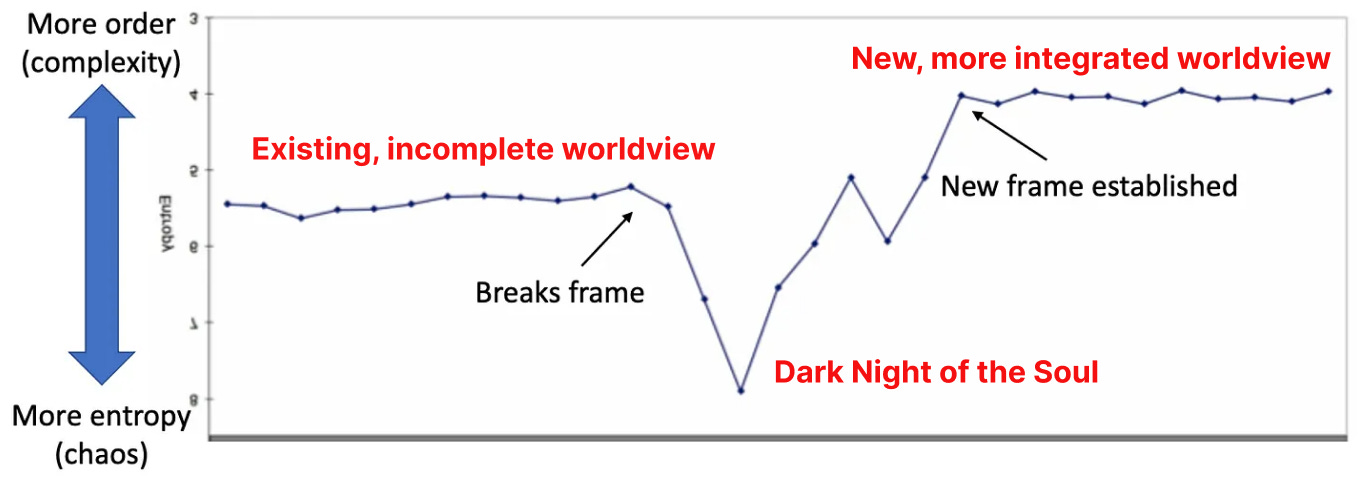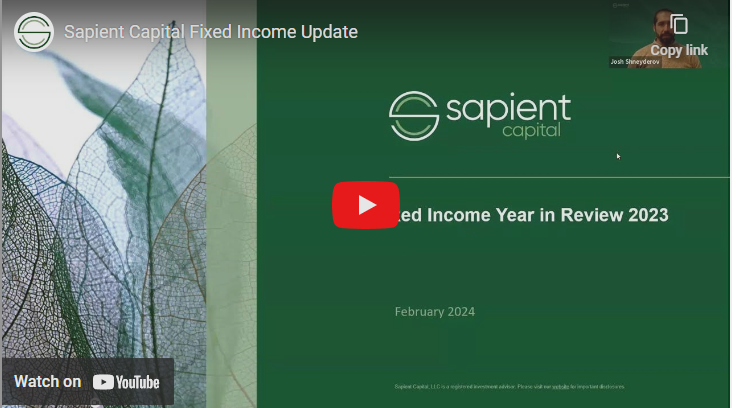The Unspoken Truth About Growth.
[11 minute read/ 8 minute listen]
Audio version available here.
“What is to give light must endure burning.”
-Victor Frankl

The Silent Scream
A recent working paper that studied 500,000 people in developed nations found that major indicators of mental duress (depression, thoughts of suicide, stress, headaches and alcohol use) peaked in midlife. This happened regardless of income, nationality, gender, or whether or not people had kids. The authors concluded that the sheer scale of the problem “has not been grasped by the affluent world’s policy-makers.”
Even if this crisis isn’t at all relevant to you personally, it still helps illustrate something that’s universally interesting.
Much of the developed world doesn’t understand how major transitions work, especially in midlife.
I frequently encounter people in various degrees of distress caused by being stuck or lost, mostly professionally. I offer them all a profoundly optimistic insight. I believe your present suffering is directly proportional to your future potential. I can’t see how it could be any other way. If you had no latent potential, and were content to be stuck in a mediocre life, there would be no psychological pain.
In fact, whether it was Lincoln, Mandela, Woolf, Gandhi or Churchill, it’s quite hard to find a “great” person that didn’t experience equally intense periods of mental suffering.

I write about wealth, and we all exist within a capitalist system. The reality for most of us is that we want meaningful work we can be compensated for. An ideal existence is to be paid to grow towards your maximum potential.
The vast majority of us start our professional lives as parts of a larger organization. This can provide us with marketable skills and necessary discipline. But it sometimes means adopting a professional persona that increasingly conflicts with your internal sense of integrity. The mask that eats your face. Too often we’re paid to stagnate, not to grow.
A crisis is a dramatic way of manifesting the potential future you. It calls us into transition periods. These liminal spaces are almost always profoundly unpleasant. Otherwise you wouldn’t move through them! They can also take a really long time. Most partners have patience for a few weeks or months. But in my experience (and the data1), they can take years.

Know Thyself to Grow Thyself
Ascent to adulthood is a trip through hell, no heaven about it. The single defining feature of the spiritual marketplace is that they promote contentment in the sewer-dungeon rather than escape from it.
– Jed McKenna
Contrary to a lot of self-help and spiritual literature, I’m not sure that we can travel from “corporate value” to “personal value” either quickly or easily. This is because in order to get paid to be yourself, you first need to know what your unique gifts are and then match them to what the world needs. This process often requires an intense suffering you wouldn’t voluntarily buy, even if you could find a guru crazy enough to sell it to you.
After a chrysalis forms, the caterpillar’s body releases enzymes that dissolve cells in its muscles and organs, leaving behind only the most vital life-supporting cells. It does not sound fun. But, like the caterpillar, there are neurological and cultural clues that human midlife can present a natural maturational window into a new developmental stage.2 It’s a spiritual puberty that deepens our relationship with reality. It burns off the dead wood and leaves only the green shoots of growth that are authentically our own. Yet Western capitalism is abjectly lacking economic or social chrysalises into which our new selves can grow safely. I speak from harsh experience following an incomprehensibly hellish three years of my own life.
A substantial benefit of private wealth, for you or your family, is that it can provide some shelter from the storm during a transformation. As long as it doesn’t get so comfortable in there we forget to change.
The primary reason that midlife transitions are so hard and misunderstood is that they frequently require a complete reversal in the way we have operated up until this point. We need to surrender to subtle, intuitive evolutionary forces that are vastly more effective guides than our limited-but-loud intellect. This collision between fate and free will often means the two halves of our psyche go to war. So there’s no energy or even mental bandwidth left for anything else.
A society that denys the existence of an intelligence beyond our individual minds will have no mechanisms to help people through this transitional process.
We lack the tools to even diagnose a spiritual sickness, let alone heal it. A culture that has no rites of passage will struggle to produce balanced adults. It’s what they definitely don’t teach you at Harvard Business School.
Faith Through Fractal Fable
If this all feels a bit too fluffy and anecdotal, I’d point you back to one of the most pivotal realizations of my life. The Hero’s Journey myth that dominates our culture and media describes the structure of a “phase transition” across multiple scales of reality.
Evolution trends towards complexity, and the Hero’s Journey is the story that humans tell to describe that process as it applies directly to all of us.
Your personal descent into suffering, and hopeful re-emergence at a higher level of flourishing, maps directly onto a universal pattern in nature. You can have confidence in that.

The death and rebirth stage may not be universal to everyone, but it’s common enough to be built into the structure of the story. In fact it’s usually the climax. I’m still not entirely sure what it means, or why we need it. But one convincing explanation is that it represents the dissolution of a flawed model of the world. At the largest scale, this means the replacement of our misguided delusions with the guiding intelligence at the top. Our entire hierarchy of beliefs comes crashing down in the process. As it’s probably the most radical change of our lives, it makes sense that it would happen only once we have a lifestyle and psyche strong enough to withstand it. A midlife transition also gives us long enough afterwards to fully manifest the gifts the process gives us.
I believe our “value” is primarily determined by the quality of our connection to the forces that can create through us. In order for us to be a “clean pipe” for that process, we need to clear our own internal blockages. It’s a consistent pattern that midlife puts you up against a failed coping mechanism, something that keeps you separated from life. As Brené Brown puts it in the single best piece I’ve ever read on midlife crises, “your armor is preventing you from growing into your gifts.” Only once we’ve started to do that, I find economic value often follows. The degree to which your outer life sometimes reflects your inner life is nothing short of mystical. You always seem to have to take the first step yourself, to cross the threshold voluntarily. It’s easier to act yourself into a new way of thinking, than it is to think yourself into a new way of acting.
Once you hear the call to adventure, you have the choice of the pain of stagnation or the uncertainty of exploration. Both are impossibly daunting, but only one of them definitely ends in a literal or metaphorical death. At least that guiding intelligence can sometimes make the path a little clearer by giving you energy along the route.
As I’ve been studying transitions for years, I intuitively knew much of this was true before my own descent into crisis. It’s what gave me the courage to jump. But it didn’t help reduce the suffering that followed. AT ALL. My family didn’t care that I was, in fact, participating in the complexification of the universe. And trust me, the experience itself was infinitely more pitiful than it was “heroic.” As a culture, we tend to glorify physical suffering and stigmatize mental suffering. The privately depressed person who somehow hauls themselves out of bed every day gets far less recognition than the public marathon runner. Facing the constant shame of not knowing how to answer “so what do you do?” How to explain that gap on the resumé. Watching your savings drain like sand in an hourglass.
If somebody in your life is suffering this way I’m genuinely not sure how you can help. The visual I get is of crossing a narrow wooden beam, blindfolded, over a dark abyss. The role of friends and family is perhaps just to hold our hand as we feel each footstep forwards.
Instead we often reflexively recoil from somehow being tainted by failure or mental illness. It’s the nemesis of our performative hustle culture. Not only does this show a stunning lack of compassion, it makes a period defined by loneliness even lonelier. But your true potential will never manifest without an equivalent challenge. The unpleasant reality is that psychological suffering is often a central part of an optimal growth process. Speaking purely personally, every single aspect of my life is meaningfully better now than it has ever been before. For now.
The key message I wish to emphasize is that the leap can be worth it, and the suffering often has a deeper purpose.
When people remember the past, they don’t only talk about happiness. It is often the ordeals that seem most significant. People shoot for happiness but feel formed through suffering.
-David Brooks
Related Reading.
- Watch/Listen. The Exodus Series on YouTube.
- Why watch/listen. The contrast between Jordan Peterson’s abrasive Twitter persona and his capacity for nuanced insight continues to amaze me. This current round-table series on Exodus is superb. Exodus is an allegory about the universal pattern of transitions: out of tyranny, through the desert, to the Promised Land. In his stunning Jacob’s Ladder lecture, Peterson notes that, after his struggle, Jacob was renamed Israel, or “he who wrestles with God.” The implication is that willingly taking on a truly massive psychological struggle not only redeems us as individuals, but might bring through insights that can alter all of society. Indeed this is explicitly the role of the shaman, prophet or hero.
- Read. Career transitions & working identity / pt. 3 by Ritvik Carvalho (24 minute read)
- Why Read. This piece by my friend Ritvik Carvalho is so good I’m jealous I didn’t write it. It discusses the pain and paradoxical freedom of liminal spaces, as well as offering some practical tips for how to navigate them. Personally, I wished I’d had what John Vervaeke calls the “ecology of practices.” This is a dynamic combination of contemplative, meditative and embodied pursuits. They keep you grounded when your intellect can fly off into the ether or your ego can fall through the floor.
- “Society gives a lot of importance to new external changes. But neglected are the internal psychological states one must go through in order to successfully transition to a new situation.”
- Read. What Suffering Does, by David Brooks (7 minute read)
- Why read. Brooks’ book The Road to Character is a great collection of stories of how suffering forms you as a person, and this short article makes some resonant points.
- Recovering from suffering is not like recovering from a disease. Many people don’t come out healed; they come out different. They crash through the logic of individual utility and behave paradoxically. Instead of recoiling from the sorts of loving commitments that almost always involve suffering, they throw themselves more deeply into them. Even while experiencing the worst and most lacerating consequences, some people double down on vulnerability. They hurl themselves deeper and gratefully into their art, loved ones and commitments.
- The suffering involved in their tasks becomes a fearful gift and very different than that equal and other gift, happiness, conventionally defined.
The information provided is for educational and informational purposes only and does not constitute investment advice and it should not be relied on as such. It should not be considered a solicitation to buy or an offer to sell a security. It does not take into account any investor’s particular investment objectives, strategies, tax status or investment horizon. You should consult your attorney or tax advisor.
The views expressed in this commentary are subject to change based on market and other conditions. These documents may contain certain statements that may be deemed forward looking statements. Please note that any such statements are not guarantees of any future performance and actual results or developments may differ materially from those projected. Any projections, market outlooks, or estimates are based upon certain assumptions and should not be construed as indicative of actual events that will occur.
1. For people starting their journey I recommend the deeply practical book Working Identity, by Herminia Ibarra. She found major career transitions take three to five years. Mine took three.
2. “As Jung also suggested that the individuation process usually begins around age forty, we seem to be dealing here with a maturational window not “officially” recognized in the West. The existence of such a window has received an unexpected confirmation by contemporary neurophysiology. It has recently been discovered that myelination in the hippocampal formation of the limbic system, which was once thought to end in adolescence, increases thirty-three to fifty-five percent in the fifth and sixth decade of life. Myelination in the limbic area is associated with emotional maturity, affect intensity, and meaningful symbolic connectivity.”– Helene Shulman, Living at the Edge of Chaos.


